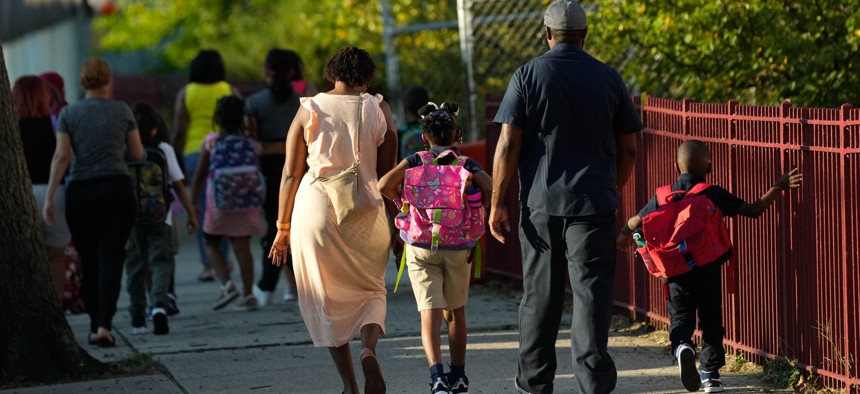Education
Combating chronic absence at NYC schools
Through its program, the Attendance Success Initiative, the YMCA of Greater New York is battling chronic absenteeism and seeing improvement in attendance.

(Michael Appleton/Mayoral Photography Office) Students return to school from summer break on the first day of school at P.S. 121 Throop school in the Bronx on Thursday.
The YMCA of Greater New York is battling chronic absenteeism during the 2022-2023 school year through its new program called the Attendance Success Initiative. The new program, which started as a pilot program last school year, aims to increase attendance through case management, incentives and celebrating the success of the students. The program served over 200 students at 13 sites last year and has now expanded to 15 sites this school year.
The Attendance Success Initiative was created in response to the high rates of absenteeism during COVID-19. Chronic absenteeism is defined as missing 10% or more of the school year. Last year, about 200,000 students were chronically absent, according to Families for Excellent Schools. Additionally, 56% of 12th graders missed 18 days of school last year, and nearly 50% of Black and Hispanic students were chronically absent as well.
So far, the program in P.S. 38 in Harlem has reported an average increase of 11% in attendance and improved attendance among 83% of participants. P.S. 26 in Jamaica, Queens, saw an average increase of 12% in attendance and improvement among 89% of participants.
“At the root of everything we do, we want kids to feel awesome about themselves, and we know that regular attendance to school really build self esteem helps contribute to building social emotional assets that help throughout their academic career.” said Lauren Barr, vice president of youth community and development at the YMCA of Greater New York.
“At the base of the program, this is an SEL program. A social emotional learning program as a case management program. So the one real distinct goal that we were going to measure ourselves with and hold ourselves accountable to was increasing attendance decreasing chronic absenteeism, but bigger than that, to foster a love of learning to help kids build friendships to help students and families view their school buildings and their after school buildings as safe and supportive places,” said Barr.
The program has seen success through its method of case management, learning the reasons why students may be chronically absent and supporting them through their circumstances. The program also provides incentives, such as coffee for the parents in the morning or a fruit parfait social for the students.
“There's nothing like watching a kid not only having a blast, but also being surrounded and celebrated by caring adults for something. Typically, not attending school has such negative connotations and kids feel a lot of penalty and a lot of judgment for that, but they're often not celebrated or acknowledged at all for the hard work of showing up to school.” said Barr.
Right now, the program focuses on elementary school students, but hopes to serve older grades as the program expands.
“Our long term goal is to help alleviate the chronic absenteeism that we've seen on an uptick since COVID. We also know that teams specifically have increased feelings of isolation. We know that schools important, we know that these caring environments are important. So long term, our goal is to help the city unwind from this 40% that we've currently been seeing back to way below where we are pre-pandemic.” said Barr.
